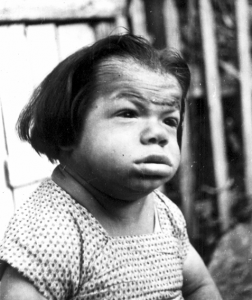Cretinism is a medical condition where there is an occurrence of hypothyroidism early in life. It is, therefore, a disease affecting the thyroid gland with low levels of thyroid hormones (hypothyroidism) in the blood since birth. It causes stunted mental and physical growth if left untreated. Cretinism is also known as congenital hypothyroidism, a name that is has been preferred recently.
The condition may occur due to lack of sufficient iodine during pregnancy in the mother’s body or a problem with the infant’s thyroid gland. A baby requires iodine for the production of thyroid hormones essential for the healthy growth of the nervous system and brain.
The 20th century saw the introduction of iodized salt in some parts of the world, which reduced the cases of cretinism significantly.
Cretinism vs. myxedema.
Myxedema is a severely underactive thyroid gland in grown-ups while cretinism is the thyroid deficiency in an infant. Myxedema also refers to skin changes due to low thyroid hormone levels.

Signs and symptoms.
- No weight gain
- Lethargy, fatigue
- Stunted growth
- Poor feeding habits
- Exaggerated bone growth
- Constipation
- Mental retardation
- Hoarse voice
- Excessive sleep
- Cool and dry skin
- Large tongue
- Jaundice
- Pale skin
- Goiter (enlarged thyroid due to swelling in the neck)
Causes of Cretinism.
Congenital hypothyroidism in infants is caused by:
- Abnormally small, missing or poorly formed thyroid.
- Insufficient amounts of iodine in the body of a mother during pregnancy.
- A genetic disorder affecting the production of thyroid hormone.
- Anti-thyroid treatment or radioactive iodine for thyroid cancer treatment during the pregnancy period.
- Medication use that disrupts thyroid hormone secretion.
Iodine is not made in human bodies; therefore, it is obtained from food. It is henceforth advisable to consume foods containing iodine during pregnancy to boost an infant’s abilities to get and produce sufficient iodine amounts. Iodine is injected into food from soils. Other parts of the world have soils that lack iodine.
Treatment options.
Screening of thyroid hormone levels whereby a small blood sample from a baby’s heel is tested. The lab checks the levels of thyroid-stimulating hormone (TSH) and thyroid hormone (T4).
Pediatric endocrinologists are doctors that treat cretinism. They mainly give infants thyroid hormone (levothyroxine) during the first four weeks; otherwise,a permanent intellectual impairment may occur.
Associated conditions and complications.
Babies born with underactive thyroid glands usually develop intellectual disability when treated is delayed and no treatment at all. The IQ drops several points for every month that treatment is delayed and growth and bone strength may also be affected.
Other complications include:
- Hearing and vision impairment.
- Memory and attention problems.
- Mutism or speaking inability.
- Muscular spasticity